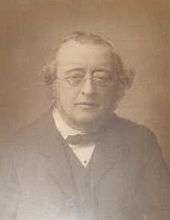Alfred Gaul
Alfred Robert Gaul (30 April 1837 — 13 September 1913) was an English composer, conductor and organist.[1]

Gaul was born in Norwich, where he studied under Zechariah Buck.[1] By the age of nine he was a chorister at Norwich Cathedral, and at the age of seventeen he was appointed as the organist of the parish church at Fakenham.[2] In 1859 he moved to Birmingham, where at the age of twenty two he was appointed organist at St. John's Church, Ladywood.[2] In 1863 he took the Bachelor of Music degree at the University of Cambridge.[1] He was Master of Music at St Augustine's Church, Edgbaston from 1868,[2] the first Birmingham church to have a surpliced choir.
In 1877 Gaul started teaching the first classes in the theory of music, harmony and counterpoint at the Birmingham and Midland Institute, marking the first step towards providing a fully rounded musical instruction at the institution that would eventually become the Royal Birmingham Conservatoire.[3] He would later be appointed as professor of orchestration and composition at the school.[4] He taught singing and harmony at the King Edward VI High School for Girls.[4]
Gaul wrote a large quantity of choral music in a simple melodious style influenced by Spohr and Mendelssohn. His cantatas were widely performed on the music festival circuit, with the best known The Holy City – premiered at the Birmingham Music Festival in 1882 – being the most popular of its era.[5] At the time of Gaul's death in 1913 it was the most performed work of English choral music in history,[2] and by 1914 over 162,000 copies of its vocal score had been sold.[6] The Holy City and his earlier cantata Ruth (1881) were also popular in the United States.[4]
His compositions include:
- "Around the Winter Fire";
- The Holy City, Op.36;
- Israel in the Wilderness, Op.43;
- "Jesus Christ is Risen Today";
- Joan of Arc;
- "Let the people praise Thee, O God";
- The Months, Op.38;
- Ruth, Op.34
- "Sing, O Heavens";
- The Ten Virgins, Op.42;
- "The Union Jack".[7]
References
- Fuller Maitland, J.A., "Gaul, Alfred (Robert)", Grove Music Online, Oxford University Press, retrieved 2017-04-17
- "Obituary: Alfred R. Gaul", The Musical Times, Musical Times Publications Ltd., 54 (848): 661, 1913, JSTOR 907424
- Birmingham Conservatoire after 125 years (PDF), Birmingham: Birmingham Conservatoire, 2011, p. 4, retrieved 2017-04-17
- Humphreys, Maggie; Evans, Robert, eds. (1997), "Gaul, Alfred Robert (1837-1913)", Dictionary of Composers for the Church in Great Britain and Ireland, London: Bloomsbury Publishing, p. 125, ISBN 1441137963, retrieved 2017-04-23
- McGuire, Charles Edward; Plank, Steven E. (2011), "Gaul, Alfred R. (1837-1913)", Historical Dictionary of English Music: ca. 1400-1958, Lanham, Md: Scarecrow Press, p. 136, ISBN 0810879514, retrieved 2014-04-17
- Russell, Dave (1987), Popular Music in England, 1840-1914, Montreal: McGill-Queen's University Press, p. 217, ISBN 0773561064, retrieved 2017-04-14
- IMSLP Petrocci Music Library, https://imslp.org/wiki/Category:Gaul,_Alfred_Robert
- Claridge, M. A. (September 2012). "King Edward's School, Five Ways: The Headmasters Who Shaped and Steered the School During its First 75 Years" (PDF). p. 14. Retrieved 27 January 2020.
- "1881 England Census for Alfred R. Gaul". The National Archives of the UK (TNA). Retrieved 27 January 2020 – via Ancestry.com.